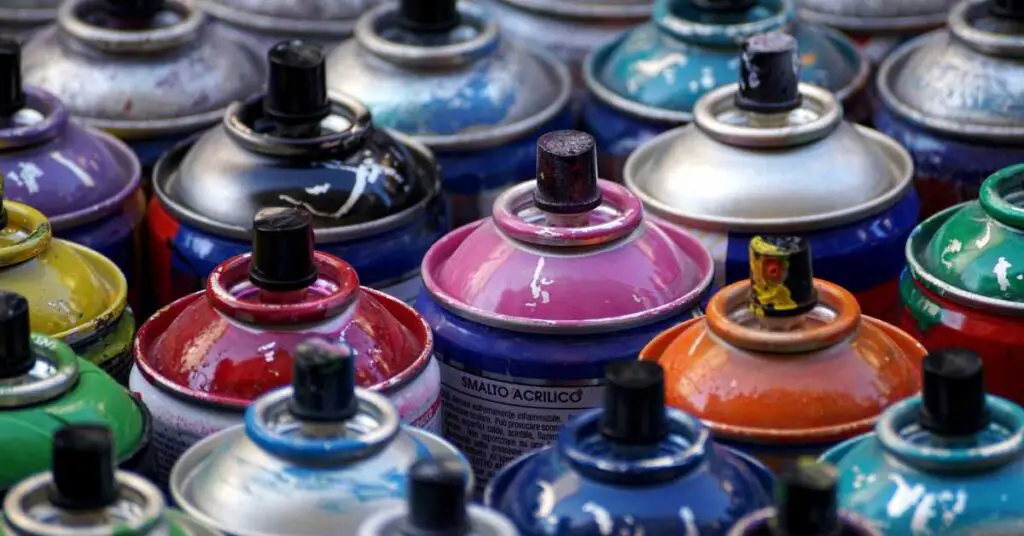Is spray paint toxic on skin? Yes, spray paint can be toxic to the skin due to the presence of harmful chemicals, such as solvents, pigments, and additives. These chemicals may cause irritation, inflammation, and dryness, with the potential for more severe issues like contact dermatitis and systemic toxicity following prolonged or repeated exposure. To minimize the risk of skin toxicity, always wear protective gear, work in well-ventilated areas, and opt for low-VOC or water-based paints when possible. If spray paint comes into contact with the skin, promptly remove the paint and wash the affected area with soap and water.
Hey there, fellow DIY enthusiasts and spray paint lovers! I know we all enjoy the thrill of transforming a dull surface into a vibrant masterpiece or giving that old piece of furniture a brand-new look. But have you ever stopped to think, “Is spray paint toxic on the skin?” Well, I’ve been wondering the same thing, and I just had to find out!
So, I went on a mission to uncover the truth about the potential dangers of spray paint on our skin. Are you ready to dive into this colorful world and discover what’s really inside that aerosol can? Let’s go!
What’s in Spray Paint?
Spray paint is a mixture of various components, including:
- Pigments – Provide color and opacity.
- Binders – Hold the pigments together and help the paint adhere to surfaces.
- Solvents – Dissolve the pigments and binders, ensuring a smooth and even spray.
- Additives – Enhance certain properties, such as drying time and weather resistance.
Many of these components are potentially hazardous. Let’s discuss the potential dangers associated with each.
Pigments
Pigments found in spray paint often contain heavy metals like lead, chromium, and cadmium. These substances are known to be toxic and can have harmful effects on human health if ingested or absorbed through the skin.
Binders
Binders are typically made from synthetic or natural resins. While they are generally considered safe, some binders may contain harmful chemicals, such as formaldehyde, which could cause skin irritation or respiratory issues.
Solvents
Solvents are the primary concern when it comes to spray paint toxicity. Many solvents are volatile organic compounds (VOCs), which can cause a range of health issues if inhaled or absorbed through the skin. Common solvents include acetone, xylene, and toluene.
Additives
Additives can include a variety of chemicals, some of which may be harmful. For instance, biocides are added to prevent mold and bacterial growth in the paint, while plasticizers are used to improve flexibility. These chemicals can cause skin irritation and other health issues if exposed directly to the skin.
Is spray paint bad for your skin?
Spray paint can be bad for your skin, as it may cause irritation, dryness, and inflammation. Long-term exposure may lead to more serious skin conditions, such as contact dermatitis, making it essential to minimize skin contact with spray paint.

Potential Health Risks
Direct exposure to spray paint on the skin can lead to several health risks, including:
- Skin irritation and inflammation: Many spray paint components can cause redness, itching, and even chemical burns if they come into contact with the skin.
- Dermatitis: Prolonged or repeated exposure to spray paint chemicals can lead to contact dermatitis, a condition marked by red, itchy, and inflamed skin.
- Systemic toxicity: Some chemicals in spray paint can be absorbed through the skin and enter the bloodstream, potentially causing damage to internal organs and other health issues.
Are all spray paints toxic to the skin?
While most spray paints contain chemicals that can be harmful to the skin, some low-VOC, and water-based paints may be less toxic. Nonetheless, it is crucial to wear protective gear and follow safety guidelines when using any spray paint to minimize potential health risks.
Preventive Measures
To minimize the risk of spray paint toxicity on the skin, follow these safety tips:
- Wear protective gear: Always wear gloves, long sleeves, and long pants to minimize skin exposure. Protective eyewear and a mask are also recommended to protect your eyes and respiratory system.
- Work in a well-ventilated area: Ensure adequate airflow to disperse harmful fumes and minimize the risk of inhalation.
- Choose low-VOC paints: Opt for spray paints with low or no volatile organic compounds to reduce the potential health risks.
- Follow manufacturer’s instructions: Read the label and follow the guidelines provided by the manufacturer for safe use and disposal.
Here is our favorite protective mask and the disposable gloves that we use.
What to Do if Spray Paint Gets on Your Skin
If spray paint accidentally comes into contact with your skin, follow these steps:
- Remove the paint: Gently wipe off as much paint as possible with a cloth or paper towel.
- Wash with soap and water: Rinse the affected area thoroughly with mild soap and lukewarm water. Avoid using solvents, as they can further irritate the skin.
- Apply a moisturizer: After washing, apply a fragrance-free moisturizer to the affected area to help soothe and rehydrate the skin.
- Monitor for symptoms: Keep an eye on the affected area for any signs of irritation or inflammation. If symptoms persist or worsen, consult a healthcare professional.
- Seek medical attention if needed: If you experience severe pain, blistering, or difficulty breathing, seek immediate medical attention.

Does spray paint come off of hands?
Spray paint can be removed from hands by gently wiping away excess paint with a cloth or paper towel, followed by washing the affected area with mild soap and lukewarm water. Avoid using solvents, as they can further irritate the skin.
How long does it take for spray paint to dry on the skin?
The drying time for spray paint on the skin varies depending on factors such as the specific paint formulation and environmental conditions. In general, spray paint can take anywhere from 15 minutes to a few hours to dry on the skin. However, it is best to remove spray paint from your skin as soon as possible to avoid potential irritation or other health risks.
Will getting spray paint on your skin one time have lasting effects on your health?
In most cases, getting spray paint on your skin one time is unlikely to have lasting effects on your health. Accidental, short-term exposure to the chemicals found in spray paint may cause temporary skin irritation, redness, or itching, but these symptoms usually subside once the paint has been removed and the skin has been properly cleaned.
However, it is important to consider the specific chemicals in the spray paint and the individual’s sensitivity to these substances. Some people may have a more severe reaction to certain chemicals, leading to more intense skin irritation or even an allergic response. In such cases, it is essential to seek medical attention if symptoms worsen or persist after removing the paint and washing the affected area.
Furthermore, while a single exposure is unlikely to cause long-term harm, repeated or prolonged contact with spray paint chemicals could potentially lead to more serious health issues, such as contact dermatitis or systemic toxicity. Therefore, it is crucial to take all necessary precautions to minimize skin exposure to spray paint and prioritize safety when using these products.

FAQs
Here are some common questions about spray paint and skin:
Is spray paint harmful to the skin?
Spray paint can be harmful to the skin, as it contains chemicals that may cause irritation, redness, itching, and in severe cases, chemical burns. Prolonged or repeated exposure may lead to contact dermatitis or other skin conditions.
Is spray paint dangerous for the skin?
Yes, spray paint can be dangerous for the skin due to its chemical components, such as solvents, pigments, and additives, which can cause irritation, inflammation, and potentially systemic toxicity if absorbed through the skin.
Can spray paint be absorbed through the skin?
Some chemicals in spray paint, especially heavy metals found in pigments, can be absorbed through the skin and enter the bloodstream. This can potentially lead to systemic toxicity and other health issues, emphasizing the importance of avoiding skin exposure.
Is spray paint still toxic after it dries?
Once spray paint dries, most of the toxic chemicals evaporate, reducing its toxicity. However, handling dried spray paint without the proper protection may still cause skin irritation, and inhaling paint particles could pose respiratory risks.
Related: Is Spray Paint Flammable When Dry
Can spray paint cause skin cancer?
While some ingredients in spray paint, such as certain solvents and VOCs, have been linked to an increased risk of cancer, there is no direct evidence that brief skin exposure to spray paint can cause skin cancer. However, it is still essential to take necessary precautions to minimize skin exposure and reduce the risk of other health issues.
Is it safe to use spray paint on the skin for temporary tattoos or body art?
Spray paint is not designed for direct application on the skin and may cause irritation, dryness, or other adverse reactions. Instead, use body paints or makeup specifically formulated for skin application to create temporary tattoos or body art.
Can I use household items to remove spray paint from my skin?
While some household items, such as cooking oil or nail polish remover, can help dissolve spray paint, they may also cause further skin irritation or damage. It is best to use mild soap and warm water to remove spray paint from your skin safely.
Is spray paint safe for children to use?
Children should always be supervised when using spray paint, and proper safety precautions, such as protective gear and working in a well-ventilated area, should be followed. It is also essential to ensure that children do not come into direct contact with spray paint, as their skin may be more sensitive to irritation and other adverse reactions.
Final Thoughts 💭
Well, folks, there you have it! Our journey into the world of spray paint has been quite an eye-opener, hasn’t it? We’ve learned that, yes, spray paint can indeed be toxic to our skin. But don’t let that stop you from unleashing your creative genius!
Just remember to take some simple precautions like wearing protective gear, working in well-ventilated spaces, and choosing low-VOC or water-based paints whenever possible. And if you do happen to get a little paint on your skin, now you know how to handle it safely.
So, keep on creating, my friends, but let’s make sure we do it with our health and safety in mind. Happy painting!